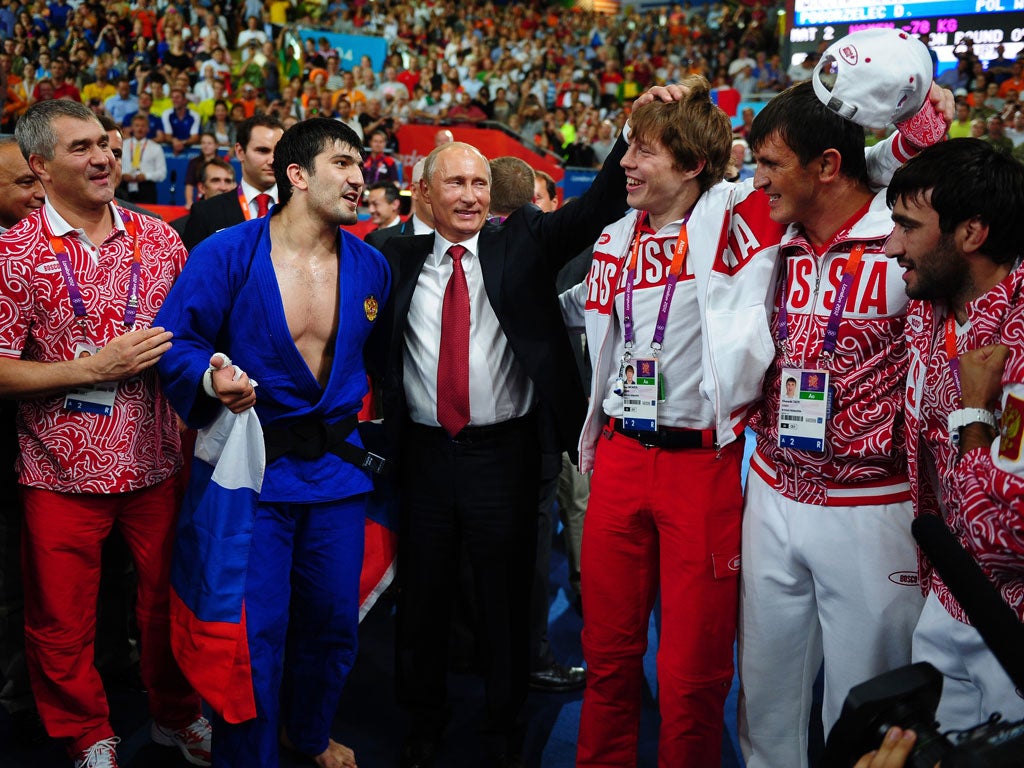Vladimir Putin is not thrown as David Cameron loses grapple
Russian leader enjoys judo after standoff at No 10

Your support helps us to tell the story
From reproductive rights to climate change to Big Tech, The Independent is on the ground when the story is developing. Whether it's investigating the financials of Elon Musk's pro-Trump PAC or producing our latest documentary, 'The A Word', which shines a light on the American women fighting for reproductive rights, we know how important it is to parse out the facts from the messaging.
At such a critical moment in US history, we need reporters on the ground. Your donation allows us to keep sending journalists to speak to both sides of the story.
The Independent is trusted by Americans across the entire political spectrum. And unlike many other quality news outlets, we choose not to lock Americans out of our reporting and analysis with paywalls. We believe quality journalism should be available to everyone, paid for by those who can afford it.
Your support makes all the difference.The world's most famous judo fan arrived matside at the Olympics yesterday – and there was plenty for him to get excited about.
Vladimir Putin, the Russian President, was accompanied by David Cameron as he headed to the Excel Centre in east London straight from talks at No 10 Downing Street.
Fittingly, one of the two gold medal contests of the session featured a Briton, while the other featured a Russian. The two men arrived soon after home girl Gemma Gibson sent the crowds wild by winning her semi-final against the odds.
Mr Cameron and Mr Putin, trailed by the Russian's substantial security detail, sat in the second row, alongside the Foreign Secretary William Hague. Without a view of the venue's many monitors showing the score and explaining the details of the event, Mr Cameron frequently sought clarification, via Mr Putin's interpreter, of exactly what was happening.
Gibson lost to the American Kayla Harrison, and never really looked like winning. The Russian, Tagir Khaibulaev on the other hand, won by "ippon" – judo's equivalent to a knockout – in a matter of seconds in the men's 100kg division, with Mr Putin moving in for the obligatory handshakes, backslapping and aggressive embracing.
By the time the Russian national anthem was played, Mr Cameron had already made his exit. If relations seemed strained, it can hardly come as a surprise given the earlier discussions in Downing Street. Mr Cameron raised human-rights disagreements – specifically the treatment of the female punk rock trio Pussy Riot – as he challenged Mr Putin over growing suppression in the country. The band's members face up to seven years in prison after staging a protest in a Moscow cathedral.
Mr Putin was reported by Russian news agencies afterwards as saying the three women on trial should not be judged too harshly. Although there was "nothing good" about the protest, "nonetheless, I don't think they should be judged so harshly for this".
The discussions between the two leaders focused on the turmoil in Syria, where profound differences exist between the two countries over how to respond. Russia and China have blocked British-backed resolutions in the Security Council to threaten the Assad regime with global sanctions.
Mr Cameron said afterwards: "Obviously we don't agree about this, but there is some common ground emerging. The Russians can see that what's happening in Syria is very bad, clearly, for the Syrian people, but I don't think it's in Russia's interest either."
Diplomatic sources said there was some common ground between the two countries on Syria – notably a recognition that time is running out for the Assad regime – but they disagreed over how to respond. Mr Putin said: "We made note of the fact that there are some things on which we see eye-to-eye, and we agreed to continue working to find a viable solution on that matter. We agreed to entrust our foreign affairs ministries to go on with that search for a viable solution."
Join our commenting forum
Join thought-provoking conversations, follow other Independent readers and see their replies
Comments